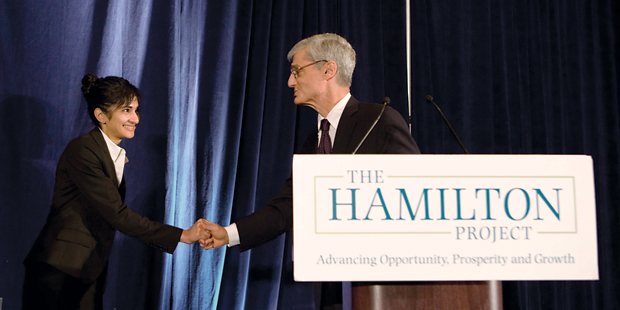Many Happy Returns
Sima Gandhi finds her tax law studies literally rewarding.
Printer Friendly VersionWhile looking through tax materials as a second-year summer associate at Simpson Thacher & Bart lett, Sima Gandhi ’07 (LL.M. ’10) discovered that tax law intrigued her more than corporate litigation. “There are gray areas, and part of understanding them is grasping the intent behind it and the legislative history,” she said. “I found it made even reading the paper a little more interesting because you understand to a greater degree why something was relevant in Congress.”
Returning to law school in the fall, Gandhi dived into tax, taking five tax courses in her third year. “[Associate Professor Lily] Batchelder looked at me like I was nuts,” she said. “It was a late-developing interest, but I love it and I’m glad I went with it.”
Gandhi found herself challenged in learning so much tax law in one year, but her enthusiasm didn’t flag. She took Professor Leo Schmolka’s demanding Corporate Tax class at the same time as the basic income tax course. On Acting Assistant Professor Joshua Blank’s Tax Procedure and Timing, she exclaimed: “He’s such a fantastic teacher that he even made tax procedure interesting, and that’s about filing forms!”
It was while taking Batchelder’s Tax and Social Policy seminar that Gandhi had the inspiration for an A-paper that proposed increasing college enrollment among low-income students by accelerating student loan subsidies.Gandhi identified inefficiencies in the government’s subsidy process, and felt that improving the system was crucial. “It’s just common sense,” she says. “In terms of equality of opportunity and creating a more democratic society, education is one of the pillars to get there. Forget about welfare. If you don’t give people hope and the chance to have an education, how are they supposed to climb the ladder?”
With Batchelder’s encouragement, Gandhi submitted a condensed version of the paper to the Brookings Institution, winning its inaugural Hamilton Project Economic Policy Innovation Prize for the most “innovative policy proposal” written by a graduate student; the selection committee included former Congressional Budget Office Director Alice Rivlin and former Treasury Secretary Robert Rubin. In addition to a $15,000 award, Gandhi was invited to a writer’s conference to help her turn her plan into a discussion paper published by the Hamilton Project.
Now a tax associate at Simpson Thacher, Gandhi has not ruled out the possibility of working in the public sector someday. The beauty of tax law, she says, is that “it does blend a very real private-sector practice with the potential to go to D.C. It’s not a surprise, considering how strong a marriage there is between social policy and the practice of tax law.” This unique mix, says Gandhi, is why tax law is never boring. “It’s not just common law judicially dictated. It’s Congress, it’s politics, it’s lobbying, it’s budget constraints. So many factors go into it…. It’s an evolving beast.”
Having the chance to publish her tax paper profoundly affected Gandhi’s law school experience. “It showed me that there is a very real possibility that ideas can make a difference,” she says. “I find that incredibly rewarding.”
—

